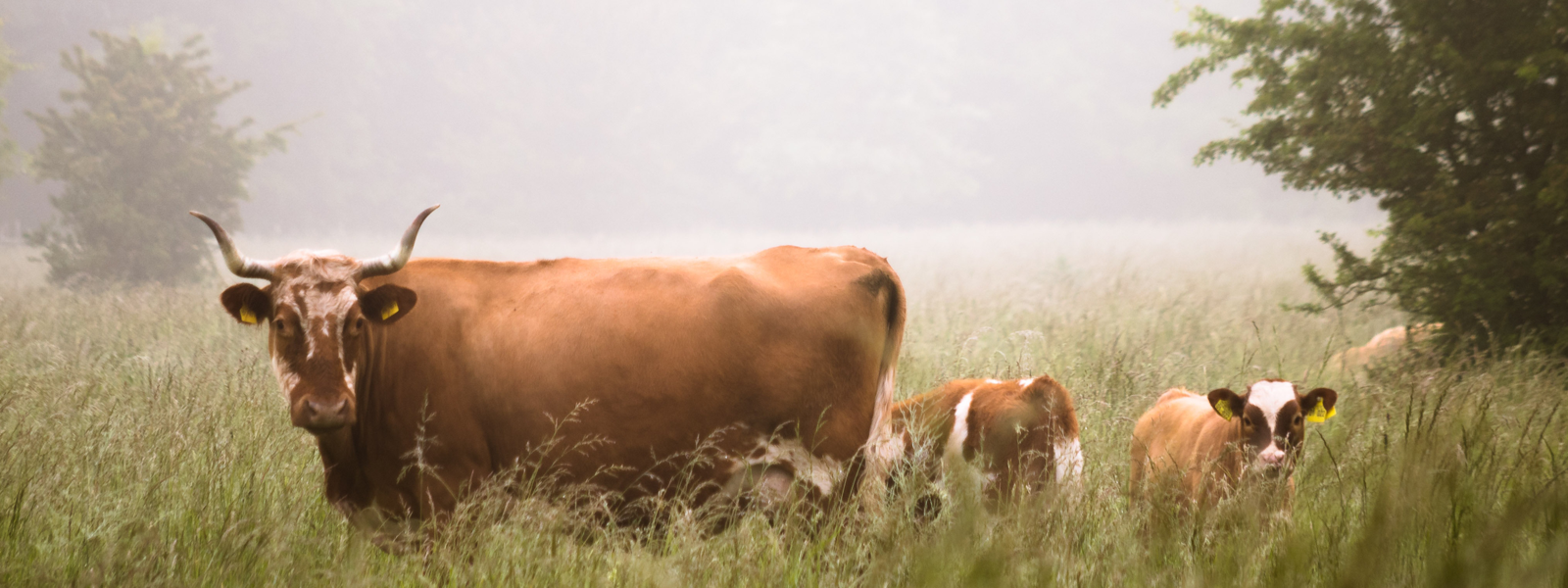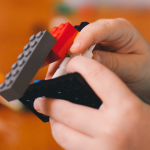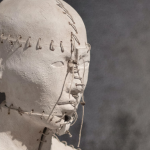The cows gather closely one week in September.
Diana has been experimenting with bunches of carnations for her daughter’s wedding, rotating each stem from one brightly-dyed water to the next to create rainbows in petals. The kitchen table is cluttered with vases and, after she checks them, she looks to the window and the cows, sees them all standing in a circle near the fence, facing outwards. Even the oldest, Mairead, stands and stretches to her full height and girth, shaking out the map of her tan and white hide.
Usually the cows stay loosely together. They find spots in the sun or avoiding the breeze, and they settle. But she takes out their feed and they do not move. Not when the grains rustle in the belly of the trough or the alfalfa piles high. Their circle remains and they survey her. As she walks over, their legs begin to shuffle and hooves score the ground. Mairead huffs, snorts. Diana keeps approaching. Then they make a noise like regret and warning; its low, slides up from their stomachs, a backwards bassoon. One cow flicks her head sharply as if to strike her away. None break the circle. Diana stops and counts them silently.
One cow is missing from the huddle: the pregnant Holstein they brought in last year to mate with the bull. From the other field, the bull is watching now too. Their noise grows. She walks back across the field deliberately slower than she wishes. Behind her she hears them calling, and the calls aren’t words, at least not words she would know how to say; still, as she lifts the metal arm of the gate and it swings away, the calls sound like, Go, they sound like, Leave.
They haven’t eaten, she tells her husband. They won’t go near it.
He scrapes thick mud from his boots onto an old square of lino. It was cold this morning, he says. Bound to rain. They probably grazed later.
Maybe. But I couldn’t see Elsbeth, she says, and she’s due any day.
They’ll shift tomorrow for milking, he says. I’ll check on her then. How are those flowers coming along? (He’d like the kitchen table back for dinner, but he knows better than to move the vases.)
By the third day, the cows are sleeping in shifts; Diana takes a torch and trudges to the fence at night, makes out the shadowy sun dial of them, the few lying down. The milking didn’t happen. They must be getting uncomfortable. Her husband wouldn’t say what did happen exactly, only came back slicker with mud than the day before. The feed has dipped a little, but that could be birds stealing the grain. Elsbeth hasn’t emerged. Diana calls their daughter, the vet, who says she’ll come out as soon as she can.
Then the circle widens. She wouldn’t have noticed had she not stood at the edge of the field all of the next afternoon. A buckling moan emanates from the centre. Most of the cows stay turned to face her, but some turn slowly inwards. Haunches shiver and the cows low. It is the sound of pushing back, with all their weight, against the ages-deep earth.
The calf is coming. They’re saying it, urging it. She approaches as much as she dares to and they don’t mind — heads barely shake — as long she keeps her place and they keep theirs. She phones her daughter; she phones her husband. The calf is born before either of them arrive. She hears the final efforts of the mother, the wet slipping of a tiny body onto the grass. She remembers needing to gather up her daughter immediately; her heart split by labour, her love burning through her. The nurses had to check the baby first, weighing her, making notes, and she waited through it all, just.
Diana rushes to the house and brings back a stepping stool. It rocks on the uneven ground, but she steadies it and climbs up, peering into the middle of the circle. The other cows have given mother and calf space. Tilting forwards and holding her arms out for balance, she can see the calf lifting its head to meet its mother’s tongue. How are children born with that trust?
Her husband is striding towards them. Everything alright, he calls.
Yes, she calls back, only don’t come too close.
He thinks she’s being ridiculous, making him stand on the stool to see, not get any nearer than that.
He says, we’re going to have to get in there sometime. Once the calf is on its feet.
We can leave them be, she says, until they’re ready.
Diana, they’re free range cows for christssake, he says. That’s as leave them be as it gets.
She insists on waiting for the other cows to peel away, though it takes all night, making trips back and forth from the house. She takes the torch and dips it downwards, trying to keep its light from streaming onto their restful faces. Diana’s daughter was born at night: outside dimming while the hospital room glowed potently. Afterwards, she wanted everything slow and dull and quiet. To understand this stranger who knew no-one but her, who recognised her body like a port. Elsbeth and her calf lean into each other in the dark. Let them be, she asks of the morning birds, as if she knows their words now too; let the quiet break gently, if it has to.
…
Biography
Eilise Norris writes flash fiction, short stories, and poetry from above a pub in Oxfordshire, UK. Her work appears in Ellipsis Zine: One, Occulum, The Cabinet of Heed, Reflex Fiction, Clementine Unbound, and Paragraph Planet. She was commended in The Bangor Literary Journal FORTY WORDS competition.
Image: Karsten Würth





